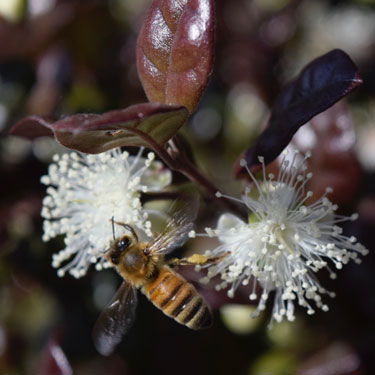Neonicotinoid insecticides - discussion
Where & how to use them; alternatives
The neonicotinoid group of insecticides have come under scrutiny recently because while not toxic to bees, they appear to cause problems with bee function. Neonicotinoids are not widely used in home gardens, and the furore created exceeds the problem. That said anything we can do to help bees survive the many natural problems they encounter will be beneficial.
Which products are neonicotinoids?
- Yates Confidor - containing imidacloprid
- Kiwicare Rose Force – containing thiacloprid
- Kiwicare Insect Hit – containing thiacloprid
- Kiwicare Insect Hit Granules – containing thiamethoxam
There are a few insects and situations where neonicotinoids are very useful to gardeners because they provide the only effective control, and when used according to the label directions, they are unlikely to cause any harm to bees.
The insects/situations where neonicotinoid insecticides are by far the most effective are –
- Non- flowering foliage ornamentals such as ferns, palms, and similar plants for control of scale and mealy bug. These insects are difficult to control on these plants because they remain hidden in the many crevices and the systemic action of the neonicotinoids is required to obtain control.
- On ornamental shrubs and non- bearing fruit trees, for control of stem boring insects , eg. lemon tree borer, currant stem borer.
- On ornamental shrubs and non- bearing fruit trees, for control of soil insects, eg. the larvae of beetles and weevils - grass grub, black beetle, weevils.
Provided the application is made according to the label – ‘Do not apply when plants are in flower or likely to flower within 3 weeks’, there is unlikely to be any harm to bees, for the above uses.
There is no satisfactory alternative for the above insects/situations.
Alternatives
Whilst some neonicotinoids are registered for wide use on many ornamentals and vegetables in the home garden, there are good alternatives which are preferred for such insects as aphids, thrips, white fly, psyllids, passion vine hopper, shield bug, and mites.
- Yates Mavrik – containing tau-fluvalinate
- Mineral Oils
- Botanical Oils
- Naturally Neem – the only neem product registered for edibles in home garden
- Insecticidal soaps – potassium salts of fatty acids.
These products vary considerably in cost effectiveness, and crops they can be used on. Refer to Garden Pest & Disease Control – by Bill Brett, book available from leading garden centres, Paper Plus book stores, and on line www.gardenpestcontrol.co.nz

23-Jan-2018

Honey bee on Lophomyrtus

